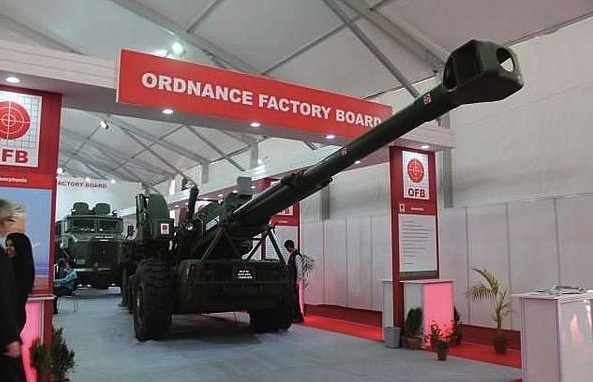
Defence Make In India: Government-Run Ordnance Factories Set For Major Revamp, Target Rs 30,000 Crore Annual Turnover
Amid the government's intense push for 'Make-in-India' in the defence sector, the state-run ordnance factories of the country are set for a major revamp to make them competitive.
Defence Minister Rajnath Singh has given his nod to setting up of a high-level panel to work out a roadmap for restructuring the ordnance factories to make those economically viable and help in modernization of the armed forces, sources said.
The panel of officials, to be headed by Additional Secretary (Defence Production) Barun Mitra, will hold discussions with various stakeholders, including the employee federations of the 41 ordnance factories, to work out a formula for raising their turnover to Rs 30,000 crore annually, from the current level of Rs 12,000 crore.
The panel sent out notices on Tuesday (24 September) to various employees' federations asking their representatives to join a meeting on 30 September along with their concerns about corporatization.
As many as 41 ordnance factories work under the Ordnance Factory Board (OFB), an autonomous body under the Defence Ministry, which the government proposes to corporatize in order to increase production and make the units profitable. These factories are proposed to be converted into 100 per cent public sector enterprises.
The panel will, among other things, deliberate upon the issue of the manufacturing orders that the ordnance factories receive, said a defence ministry official.
The step assumes significance as the government has laid immense thrust on 'Make-in-India', especially in the defence sector to make the country self-reliant in the sector, which is mostly dependent on imports.
According to OFB officials, these factories get 90 per cent of their orders from the Indian Army while the rest 10 per cent comes from various paramilitary forces under the Union Home Ministry. Quantities of orders placed with various factories are prone to fluctuations and are mostly non-economical for the factories as far as production is concerned.
"Since our clients, the armed forces, do not have prior information about their annual budgets, they cannot provide us indents beforehand for production clearance. It results in non-economical and fluctuating orders," Mukesh Singh, General Secretary, Bhartiya Pratiraksha Mazdoor Sangh, told IANS.
"At times, very high volume and quantities are demanded for particular items for which we are forced to enhance our capacity. At other times, there are no requirements or very few orders. But we cannot change our installed capacity every time," he added.
As the restructuring is expected to lead to corporatization of these factories which employ 82,000 people, the panel will also work out a roadmap to safeguard interests of employees in terms of wages, health facilities and other service matters which may arise.
Employees' federations have expressed concerns that corporatization of the factories would eventually lead to privatization and result in layoffs and job cuts. Workers in all 41 factories had gone on a strike from August 20 to 25 against the central government decision to corporatize the OFB.
However, the central government has sought to allay the fears of employees by saying corporatization of the board is aimed at increasing profits and generate more employment.
Employees' federations have argued that market principles cannot be applied to defence factories because the government decides what they produce, how much they produce, what resource to use, what price to charge and whom to sell.
Defence officials said 83 per cent of total budget allotted to the Army is related to revenue expenditures and only 17 per cent is reserved for capital expenditures.
Further, as per defence sources, the government is signing new production contracts as part of the modernization process but due to resource crunch dues of past contracts are yet to be cleared.
A series of meetings were held by defence ministry officials with agitating employees' federations in the third week of August.
Employees' federations allege the minutes of the meetings held in August have not been made available to them yet. All terms of references that have been handed out to the panel had already been discussed in those meetings, said representatives of the federations.
(This story has been published from a wire agency feed without modifications to the text. Only the headline has been changed.)